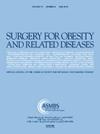Comparison of food tolerance among bariatric surgery procedures: a systematic review
IF 3.5
3区 医学
Q1 SURGERY
引用次数: 0
Abstract
Bariatric surgeries are related to reduced food tolerance (FT), which may impact on nutritional status and weight loss treatment. The present study was conducted to compare the effects of gastric banding (GB), sleeve gastrectomy (SG), and Roux-en-Y gastric bypass (RYGB) on FT. A literature search was performed using Scopus, PubMed, Web of Science, and Google Scholar to find relevant studies published up to August 2023. The primary outcome was the postoperative overall FT score assessed by the Quality of Alimentation questionnaire. Overall, 27 studies containing 4366 adults were included in the review: 15 cohort studies, 5 interventional studies, and 7 cross-sectional studies. The quality of articles ranged between low and high. Thirteen studies evaluated the effect of SG on FT; however, 4 studies reported FT following RYGB. The postsurgery FT of GB patients was examined in 1 study. The mixture of bariatric techniques was evaluated in 9 papers. Selected studies assessed FT from 1 month to 5 years following obesity surgery. Taken together, GB patients showed the lowest level of FT. Although SG and RYGB patients had no difference in FT, RYGB ones had better tolerance to protein-rich foods such as red meat, white meat, and fish. Both SG and RYGB individuals tolerated vegetables and fish more than other food groups and could least tolerate red meat and grains. After the first postoperative year, a good level of FT was found among SG and RYGB patients.
减肥手术中食物耐受性的比较:系统性综述。
减肥手术与食物耐受性(FT)降低有关,这可能会影响营养状况和减肥治疗。本研究旨在比较胃束带术(GB)、袖状胃切除术(SG)和Roux-en-Y胃旁路术(RYGB)对食物耐受性的影响。我们使用 Scopus、PubMed、Web of Science 和 Google Scholar 进行了文献检索,以找到截至 2023 年 8 月发表的相关研究。主要研究结果是通过饮食质量问卷评估的术后FT总分。综述共纳入了 27 项研究,涉及 4366 名成人:其中包括 15 项队列研究、5 项干预研究和 7 项横断面研究。文章质量从低到高不等。有 13 项研究评估了 SG 对 FT 的影响;但有 4 项研究报告了 RYGB 术后的 FT。1 项研究对 GB 患者术后的 FT 进行了调查。9 篇论文对减肥技术的混合使用进行了评估。部分研究评估了肥胖症手术后 1 个月至 5 年的 FT。综合来看,GB 患者的 FT 水平最低。虽然SG和RYGB患者的FT没有差异,但RYGB患者对红肉、白肉和鱼等富含蛋白质食物的耐受性更好。SG 和 RYGB 患者对蔬菜和鱼类的耐受性均高于其他食物,而对红肉和谷物的耐受性最低。术后第一年,SG 和 RYGB 患者的 FT 水平都很高。
本文章由计算机程序翻译,如有差异,请以英文原文为准。
求助全文
约1分钟内获得全文
求助全文
来源期刊
CiteScore
6.70
自引率
12.90%
发文量
570
审稿时长
56 days
期刊介绍:
Surgery for Obesity and Related Diseases (SOARD), The Official Journal of the American Society for Metabolic and Bariatric Surgery (ASMBS) and the Brazilian Society for Bariatric Surgery, is an international journal devoted to the publication of peer-reviewed manuscripts of the highest quality with objective data regarding techniques for the treatment of severe obesity. Articles document the effects of surgically induced weight loss on obesity physiological, psychiatric and social co-morbidities.

 求助内容:
求助内容: 应助结果提醒方式:
应助结果提醒方式:


